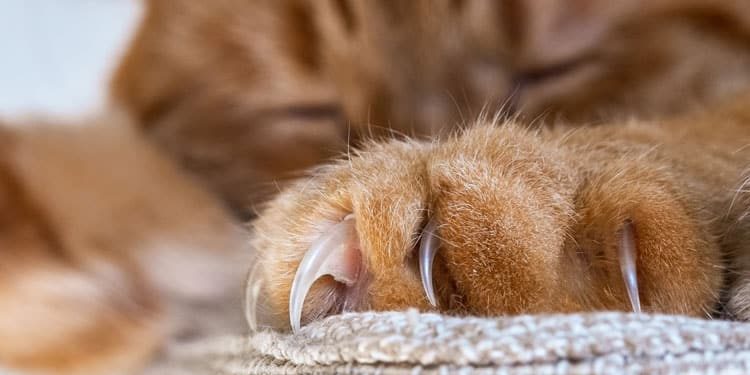Full Finger style glove size XL & Large are currently sold out. Get notified when they are back in stock.

Declawing (De-Knuckling) surgery is an inhumane, unnecessary mutilation/amputation of bones, nerves, joint capsules, and ligaments. It is the amputation at the last joint of a cat.
Will stopping declaws cause a loss of income for the veterinarian? No. Per Dr. Joffe’s letter (Canada) – Income increases when clients know the vet is compassionate/humane. Revenue from declawing is more than offset by revenue from routine nail trims and/or application of nail caps. Declaw surgery is a one-time fee.
Cat owners who are immunocompromised or have a bleeding disorder? Dr. Nicole Martell-Moran’s paper showed that declawed cats bite more. Their first defense is gone.The bites are more dangerous than scratches. Therefore, declawed cats pose a greater risk to those who are compromised. The ArmOR Hand Animal Handling Gloves can be used by cat owners while trimming their nails at home. Regular nail trims and claw caps like Soft Paws are recommended. The CDC and National Institute of Health do not recommend declaws of cats living with immunocompromised pet owners.
More cats will be surrendered to shelters or left on the streets if declaw is banned. Statistics show otherwise. After declaw bans passed in several cities in CA, there was a decrease in the number of cats surrendered to shelters. The American Association of Feline Practitioners states that there is no evidence that declawing protects from abandonment or death. British Columbia SPCA showed a declaw ban does not lead to an increased shelter Intake and euthanasia or reliquishment for destructive behavior.
Part of Dr. Laura Catena’s testimony to ban declaw surgery in the City of Pittsburgh (the City of Pittsburgh unanimously passed the declaw ban):
My name is Laura Catena and I’m a veterinarian in Pittsburgh. I almost lost my life back in 2009 when one particular feline patient who was previously de-knuckled bit my hand. Because of my injury, I had extensive surgery, I was in the hospital for a week, and then had 7 months of intensive and painful physical therapy in order to regain the use of my hand. When I was injured, I was healthy and not immunocompromised. I do believe had I been immunocompromised when I was bit, that I would not be alive today. As a veterinarian, it is my job to not only protect the health of animals, but also the health of humans. It is part of the oath that veterinarians take to protect public health. And I know from my veterinary education, my time in practice, as well as my personal experience of enduring a cat bite injury, that these bites are serious and potentially life-threatening. I do not feel that cat scratches nearly pose the same risk in any regard whatsoever.
When cats are subject to the cruel and inhumane surgery of de-knuckling of their toes, they are more likely to bite. Their defense of using their claws has been eliminated.
There are options for pet owners to manage their cat’s nails, such as nail caps, regular nail trims at home or at the veterinarian’s office. Because of my injury, and my mission to deter pet parents from this cruel and barbaric surgery, I developed gloves anxious pet owners can wear to trim nails at home – if that is the option they choose. There are many options, but the practice of de-knuckling surgery directly goes against my oath as a veterinarian to not only protect animals, but also to protect the health of the public.
Dr. Laura Catena, ArmOR Hand Gloves
Animal Planet’s Jackson Galaxy’s statement on declawing:
When cats are declawed, they experience incredible pain, both immediately after the surgery (which is often used as a procedure to test pain medication) and due to long-term phantom pain.
Declawed cats are deprived of natural behaviors—they can’t mark their territory in an appropriate way, they can’t stretch their back muscles, they can’t climb trees to escape predators, and painful paws are not going to make kneading during a loving moment very enjoyable.
When cats’ toes are amputated, you are changing how they walk, because cats naturally walk on their toes. Declawed cats pay the price later on with arthritis (imagine having to walk hunched over for your entire lifetime).
Because the amputation is unnatural (and often poorly done), some cats experience claw regrowth under the paw pad, and essentially, your cat feels like he is walking around with a pebble in his shoe.
The fact is, declawing is something that is done simply for human convenience—to essentially mutilate a living being to protect a couch. That is just crazy to me. Some compromise is needed for living with an animal. Yet many cats are declawed before even given a chance to scratch an appropriate scratching post in the first place. No cat would ever elect to be declawed. Cats need and use their claws for so many things: stretching, exercising, marking their territory, playing, protection, and hunting—all those things that boost Mojo!
Jackson Galaxy, Animal Planet


Dr. Laura Catena is the Founder and President of The ArmOR Hand Gloves.
She graduated from The Ohio State College of Veterinary Medicine and is a small animal veterinarian. Dr. Catena developed The ArmOR Hand Animal Handling Gloves after a life-threatening injury she endured while working emergency medicine. She is a member of the Women's Business Enterprise National Council and an animal welfare advocate.
Have Questions or Need Support?
Be safe. Glove up.|More Feels. Less Force.®
The ArmOR Hand Protective Gloves® are bite resistant, not bite proof.
They can decrease the severity of injury, if injury occurs.